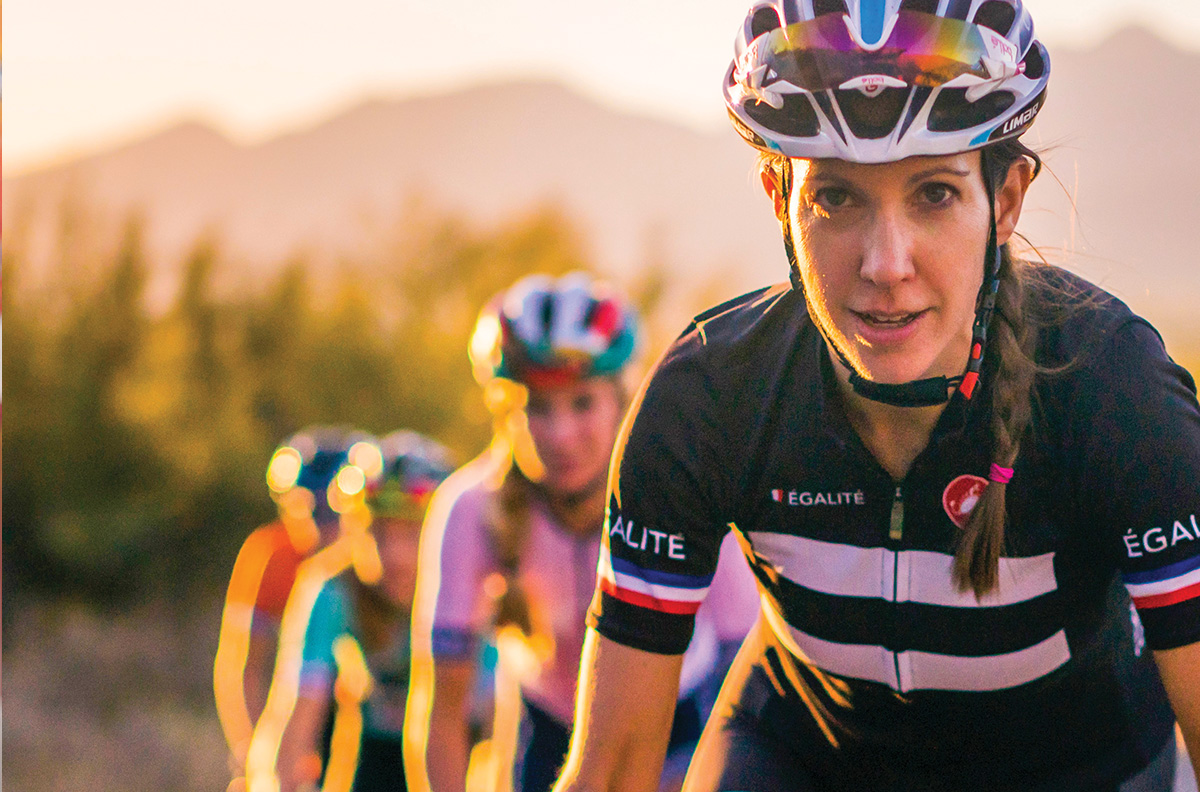
Tour de Force
Kathryn Bertine is Women’s Cycling’s Most Ardent Advocate
By Valerie Vinyard
Longtime cycling advocate and Tucson resident Kathryn Bertine was excited to watch the Tour de France Femmes on TV this year, a multi-day bike race for women finally reinstated after 33 years.
“I’m thrilled for anyone to win this amazing race,” said Bertine, who is a fierce promoter for women’s cycling. Bertine spends her summers writing in New York each year, returning to Tucson in September to operate the Homestretch Foundation, an organization she founded in 2016. Homestretch provides a place for female professional cyclists to live and train rent-free in Tucson for up to six months.
Bertine has a storied career as an athlete herself. Prior to her retirement from professional cycling in 2017, she was a professional triathlete and figure skater. She is also the writer, producer and director of a documentary film, “Half the Road.”
During a recent phone interview, Bertine was in upstate New York where she was busily writing her fifth book. In 2021, her memoir STAND: A memoir on activism, a manual for progress tells the story of her fight for women’s equality at the Tour de France, and won 2021 Indie Book Awards Best Memoir and Best Social Change. Over the past six years, Homestretch has helped 80 athletes from 17 countries. The house holds up to eight female professional cyclists, who must be at least 21 years old. Bertine said that about 60% of its residents are from North America while 40% live elsewhere, such as Afghanistan, Mexico, Australia and South Africa.
“We exist because there is a gender pay gap in women’s pro cycling,” Bertine said. “When that is equal, we look forward to shutting down.” In the meantime, Bertine raises funds for the Homestretch Foundation via homestretchfoundation.org.
Bertine works hard to make the sport equal for men and women, and her fight to bring back the female version of Tour de France was a long time coming. She noted that at other large events such as the Boston Marathon, Wimbledon or the Olympics, men and women have an equal opportunity to compete. So, in 2009, she began reaching out to the Amaury Sport Organisation, the world leader in bicycle racing and the body that organizes the Tour de France.
In the interim, she gained her first contract in professional cycling and made industry contacts during her tenure as a senior editor at ESPN. Those contacts helped her to found Le Tour Entier, an activist organization responsible for establishing La Course by Tour de France, a race for female professional cyclists that coincided with the conclusion of the annual Tour de France cycling race, which barred women since 1989.
In 2013, Bertine started “the big fight,” as she calls it, with ASO, which also organizes a host of other competitive events in golf, running, sailing and off-roading. She and her Le Tour Entier partners created a petition on Change.org calling for a women’s Tour de France. The drive amassed 98,000 signatures.
In 2014, ASO agreed to a one-day race for women. It was supposed to be lengthened every year, but it remained a one-day event until 2022. Bertine didn’t give up, and eventually her efforts prevailed, culminating in the eight-day Tour de France Femmes.
The event proved very successful, with over 3 million people tuning in to watch the Tour de France Femmes on television. The men’s Tour de France, as a point of comparison, had viewership of around 3.8 million.
“The media problem, however, is (viewers) had to pay a subscription fee to watch the race,” said Bertine of the female Tour. “With men’s racing, it’s broadcast on subscription-free channels. The fact we had over 3 million people watching the Women’s race shows there is a demand.”
While the event was a great success, Bertine said there is much work to be done.
“Because of the exposure we gained from those years, we now have the Tour de Femmes for eight days,” she said. “We believe ASO can do a lot more. They’re not done yet in creating equity for women at the Tour de France.”
She is hopeful change will continue to occur. “If I was able to effect change with a multimillion-dollar company in France, I think that goes to show that anyone can effect change anywhere in the world,” Bertine said.
She added, “This isn’t just about women racing bicycles in France. The whole world moves forward when women are equal. There will be a trickle-down effect anywhere in the world when women have an equal seat at the table.”





